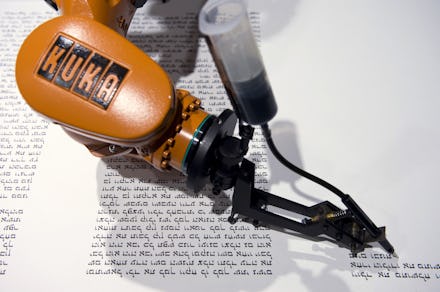This Debut Novelist Might Have Won a Literary Prize if It Weren't Actually a Robot

When computers take our assembly line jobs, we scoff: Let them do the work for us! When they beat us at our greatest games of logic, we comfort ourselves with the knowledge that creativity will distinguish us: Humans will still be the ones writing poems, novels and music.
Don't be naive.
A novel written by artificial intelligence made it through the screening process for a Japanese literary prize, Japan News reports. It was one of four novels written by an algorithm out of Future University Hakodate.
The Hoshi Shinichi Literary Award is apparently known for the openness of its application process allowing nonhuman applicants through. This is, unsurprisingly, the first time a nonhuman has entered the fiction-writing contest. The book didn't win the final prize, which was awarded on March 12.
Perhaps the scariest detail is not that an AI-written book made it to the final round, but that it wasn't the only contender.
There were 11 books written by computers in this year's competition.
The guiding hand: Before we hand over our paintbrushes and pens to the machines and line up as a species to be reassigned duties by robot overlords, we have to acknowledge that the novel wasn't solely the work of an algorithm. About 80% of the work can be attributed to human ingenuity putting together the structure and characters, the Los Angeles Times reports.
This isn't the first creative work co-authored by humanity and computers to capture the public imagination: In London, a musical written by an algorithm called Beyond the Fence had a successful West End run.
And more recently, an algorithm trained itself on 4,000 political speeches to write even more political speeches, adaptable automatically for whatever issue or political party you're arguing for.
Perhaps that last example is a bad one. If we want to call ourselves artists, after all, we're going to have to be more than human robots.